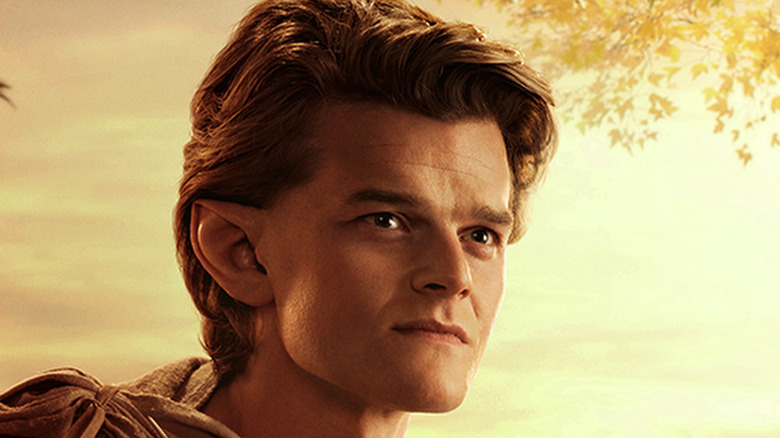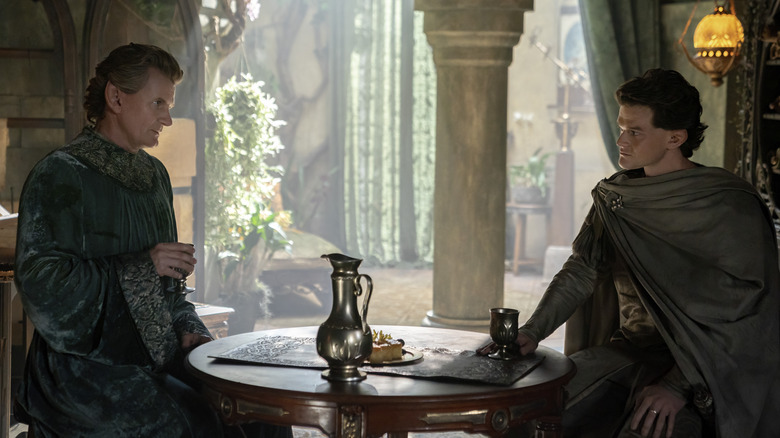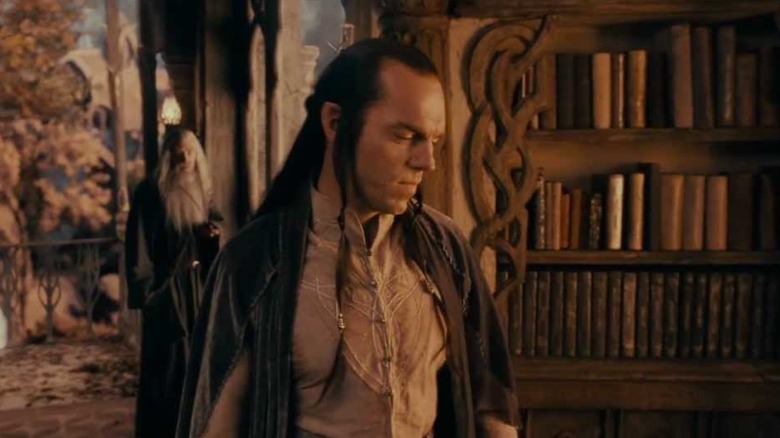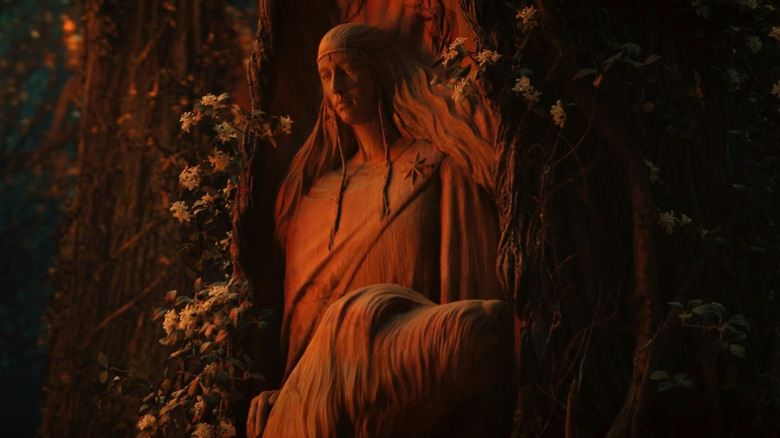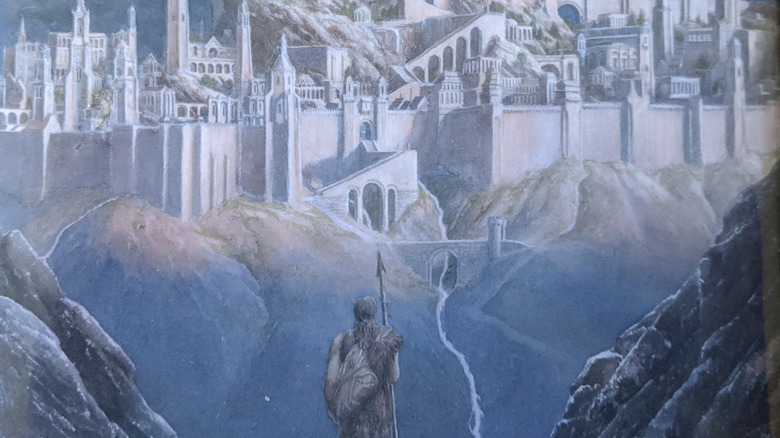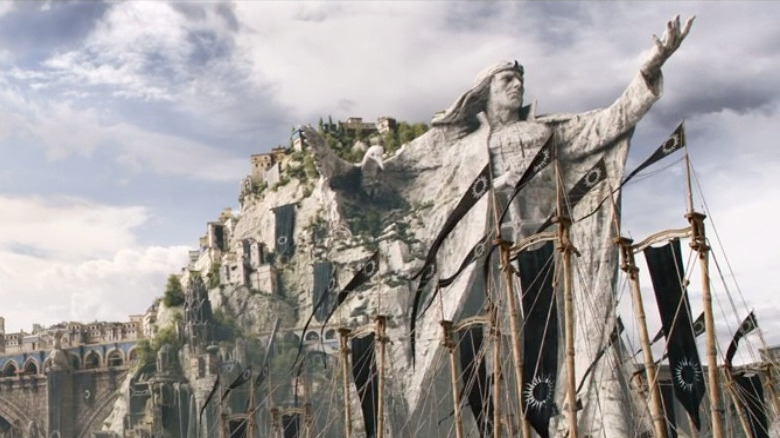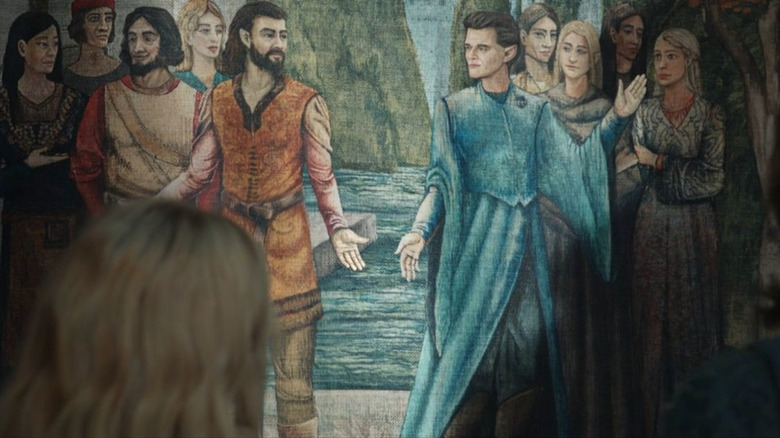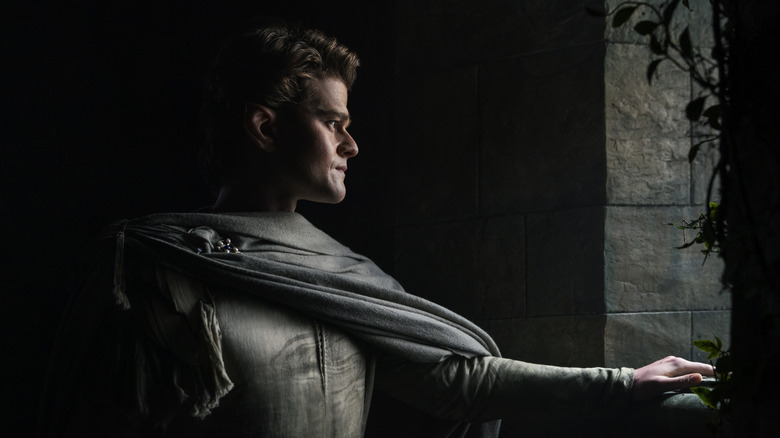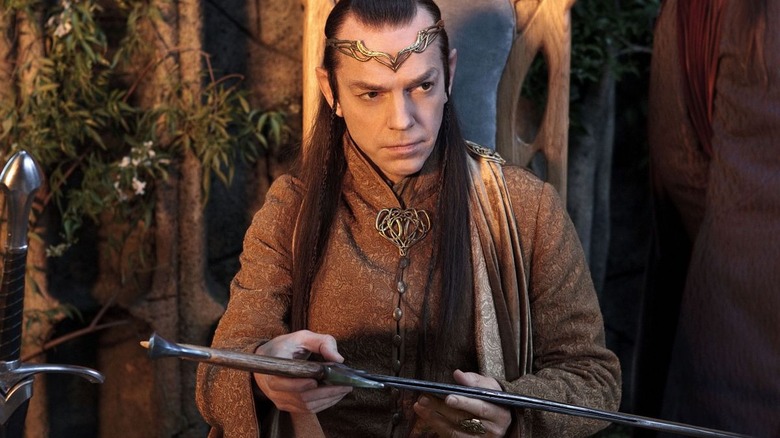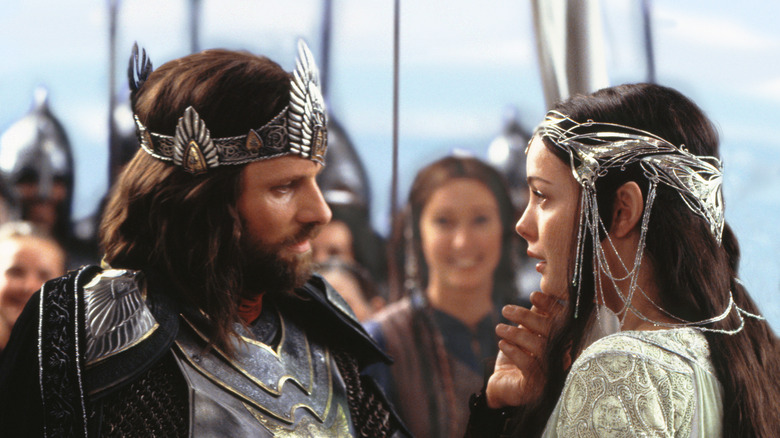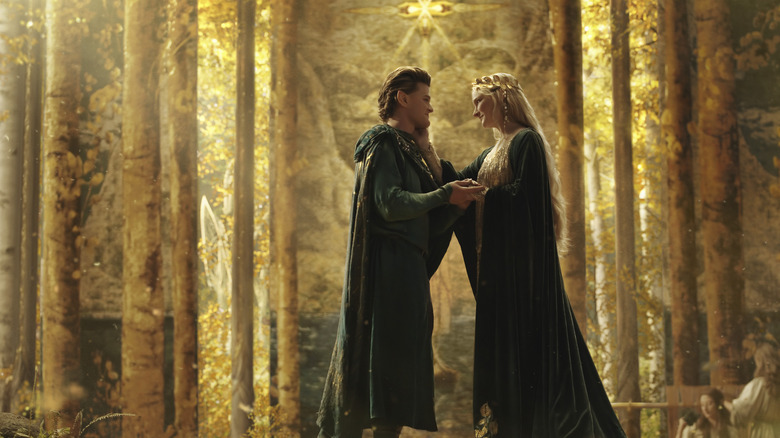The Lord Of The Rings: Elrond's Ancestry Explained
Elrond is one of the most popular characters in all of J.R.R. Tolkien's works. The guy is everywhere, showing up in "The Hobbit," "The Lord of the Rings," and "The Silmarillion." He's also in both of Peter Jackson's trilogies (played by Hugo Weaving) as well as JD Payne and Patrick McKay's "The Rings of Power" adaptation (in that case, brought to life by Robert Aramayo). Throughout all of these appearances, we get a lot of information about the character.
The kind-of half-elven (more on that in a minute) lord is wise, clever, brave, and fun. He's a healer, a leader, and a counselor. He also is connected to, like, everyone. One way or another, Elrond is related to dozens of powerful and important individuals in Middle-earth history. Some of these are around from the beginning, while others are born after the official story ends — and all of them form one of the most impressive, intricate, and all-around confusing family trees of all time.
We see glimpses of this genealogical arboreal wonder at times throughout Elrond's story. Most recently, "The Rings of Power" has dropped multiple references to his parentage, particularly honing in on his father, Eärendil the Mariner. With that knowledge, we thought it would be fun to flesh things out and explore some of Elrond's most interesting connections (both as ancestors and descendants) — and boy, are the results worth it. Literally everywhere you turn, Elrond's family is a study in wonder. From heroes to angels to birds to stars, let's break things down, shall we?
The mutt of the legendarium
Elrond's common title is "peredhel," or "Half-Elven." While the moniker represents an even split between Elf and Man, the character's backstory is actually quite a bit more complicated. There are multiple unions between Elves and Humans that factor into his background, and there's even an angelic Maiar tossed into the mix to throw off all of the math.
This multi-racial aspect of Elrond's past is something that "Rings of Power" actor Robert Aramayo has grappled with from day one, as he made clear in an interview with Looper in August of 2022. In that conversation, Aramayo pointed out, "He is the mutt of the legendarium. Everything feeds into him, and it's why he was given the choice in the first place. If you look at where he comes from — I read this thing — he's 1/16th Maiar and 8/16th this. It's mental if you wanted to break it down, so it makes a lot of sense that he was given the choice."
The point is well taken. Elrond's half-elven status isn't just a sign that an Elf and a Man hooked up at some point; it actually represents a complex web of important immortal and mortal individuals, most of whom play essential roles in Tolkien's larger narrative. With that said, let's take a look at some of the most important of those characters, starting back at the beginning of his ancestry and going right on through to his last recorded descendant.
Thingol and Melian get things started
Let's start on the supernatural side of things, shall we? While Elrond's oldest Elvish ancestors include several names worth mentioning, two of them easily top the list: Thingol and Melian. The former is one of the first Elves to ever come into existence. He helps lead many of his people on their first migration toward the Blessed Realm in the West, but he himself doesn't complete the journey. Why? Because he falls for an angel fallen from heaven. Okay, Melian doesn't literally fall out of the sky. But she's one of the Maiar, which Tolkien talks about as the god-like angelic beings that help guide the fate of Middle-earth.
Anyway, here's what "The Silmarillion" has to say about how these two lovebirds meet, "and it chanced on a time that [Thingol] came alone to the starlit wood of Nan Elmoth, and there suddenly he heard the song of nightingales. Then an enchantment fell on him, and he stood still; and afar off beyond the voices of the lómelindi he heard the voice of Melian, and it filled all his heart with wonder and desire." Thingol falls in love with Melian (it's a literal love at first sight kind of thing), and they stand entranced for years while the rest of the Elves head off west. When they finally come to, they get hitched and become the king and queen of a woodland realm called Doriath. They also have a Half-Elf, Half-Maia daughter named Lúthien...
Beren and Luthien bring Elves, Men, and Maiar together
Thingol and Melian rule Doriath throughout the First Age and are important figures in the wars against Sauron's predecessor, Morgoth. But their biggest accomplishment has to be the birth of their daughter Lúthien. Lúthien is a powerful magic wielder. One day, she runs into Beren, a mortal hero and important descendant of the group of pro-Elvish Men called the Edain.
The pair meet much like Lúthien's parents, and the woodland encounter leads to one of the most epic quests in all of Tolkien's writings. Together, they steal one of the Silmarils from Morgoth after Lúthien's dad scornfully assigns Beren with the impossible task as a "Yeah, when you bring me a Silmaril, you can marry my daughter, kid" kind of bride price. Beren and Lúthien's story goes on from there, leading on through pain, sorrow, death, and resurrection... but for the sake of our Elrond-focused purposes, let's just say that they have a son named Dior. He becomes the king after Thingol's unfortunate death, gets married to an Elven chick named Nimloth, and they have a daughter named Elwing, who happens to be Elrond's mom.
It's a lot of names, but let's go over the highlight reel. The Elf Thingol marries the Maia Melian. They have a princess, Lúthien, who hooks up with the important but mortal Man Beren. They have a son named Dior, whose daughter is Elwing. Got it? Good. Moving on.
Tuor and Idril also bring Elves and Men together
Okay, so far, we've traced the line to Elrond's mom. His dad's side of the equation is a bit easier to follow. The two important names to track here are Tuor and Idril. Tuor is another important descendant of the Edain, the Men who fight with the Elves against Morgoth. Idril is the immortal daughter of the famous Elvish king Turgon, lord of the hidden city of Gondolin.
While that story is well worth its own breakdown, let's keep the focus on Elrond. Ultimately, Tuor is sent to Gondolin to warn them of their impending doom. He's a mortal Man, but that doesn't stop him from being welcomed into the hidden community. While there, he meets Idril, they fall in love, and they get married (with the king's happy support this time). They have a son named Eärendil, too, who happens to be a mathematically half-elven offspring (50% Human, 50% Elf).
When Eärendil is still just a boy, Gondolin is discovered and destroyed by Morgoth. The survivors (including Tuor, Idril, and their son) barely escape and relocate to the shores of Middle-earth. All of this happens around the same time that Dior (remember, that's the son of Beren and Lúthien) is treacherously attacked by some nasty Elves, and his kingdom is destroyed along with its king and queen. Its survivors, including one Elwing, escape to the same seaside haven where the young Eärendil is now living. Coincidence? In Tolkien's world, we think not.
Eärendil and Elwing save the world
Tucked away in the refugee colony along the coast, Eärendil and Elwing grow up, and — you guessed it — they marry each other. In fact, they rule the little sub-kingdom together and have a pair of twin sons named Elros and, well, Elrond. At this point, Morgoth is about to take over all of Middle-earth, and mom and dad — both of whom come from separate lines of immortal/mortal ancestry — start to think of how they can help. Eärendil begins trying to sail to the Blessed Realm, where he hopes to recruit the help of the angelic Valar and the Elves who live there.
While he's at sea, though, the same group of treacherous Elves attacks the colony and destroys it. Elwing throws herself into the sea only to turn into a seabird (we're deep in Tolkien's mythological storytelling at this point), and she flies off to help her husband. Together, the two get the help they seek, and Morgoth is overthrown in the earth-shattering War of Wrath, which ends the age and literally sinks their old seaside home into the ocean. After that, Eärendil is given the shining Silmaril that his grandparents stole from Morgoth, and he sails his ship through the heavens as a star. Elwing retires to a nice seaside tower where Eärendil visits her at times.
Okay. So... great job, hero parents! One thing, though. What's up with your kids? What happened to them?
Elrond and Elros find their own way
When the Elvish civil war breaks out in their homeland, Elrond and Elros are still little kiddos, as far as Elves are concerned. Their parents are out at sea and never come back, and the boys end up being captured by their attackers, including an Elvish leader called Maglor. "The Silmarillion" explains what happens next: "For Maglor took pity upon Elros and Elrond, and he cherished them, and love grew after between them, as little might be thought."
So, Elrond and his brother grow up in sumptuous and comfortable captivity. Though the details are a bit unclear for a while, ultimately the young fellow operating independently, so they clearly are given their own freedom at some point along the way. These two lads also represent the epitome of Elvish, Mannish, Maiar genetic cross-over in that they have a wild mixture of immortal and mortal ancestry, including a dash of Melian's angelic blood added in for good measure. This is why their fate becomes so confusing; starting with their parents, each family member is given the one-time choice to opt for mortality or immortality. Elros chooses the former, becoming a mortal man and sailing off to found the kingdom of Númenor. Elrond, on the other hand, chooses the Elvish way and becomes the Herald of the High-king Gil-galad in the Elvish kingdom of Lindon, setting the stage for a long, illustrious, and immortal career.
Elrond meets his wife
Once he chooses his immortal path, Elrond embarks on a busy and illustrious Second Age career. He helps Gil-galad rule Lindon and leads an army to fight Sauron when the latter attacks Celebrimbor to seize the Rings of Power by force. In fact, this event leads to Elrond being defeated in battle and retreating to a little spot on the edge of the Misty Mountains ...where he sets up a fortress called Rivendell. From there, he continues to resist Sauron for the next age and a half.
As far as Elrond's ancestry and descendants go, this is also where he meets his wife. At one point later in the Second Age, Galadriel travels to Rivendell to visit her beau, Celeborn. The pair of Elvish leaders have a daughter, Celebrían, and as the book "Unfinished Tales" reveals, "and it was then that Elrond first saw Celebrían, and loved her, though he said nothing of it." Later on, "The Return of the King" gives up a little more information, stating that the two love birds get married 109 years into the Third Age that followed. Ah, infinitely drawn-out immortal love. There's nothing quite like it.
Anyway, this union brings two more important people into Elrond's family life: his new in-laws Galadriel and Celeborn, both of whom have their own impressive pedigrees. Yeah, Elrond just looks like a glutton for high-profile connections at this point. It's a tendency that continues right on into the next generation of Elrond Juniors, too.
Elladan and Elrohir fight for the family legacy
After Elrond and Celebrían get married, they have not one, not two, but three kids. The first two of these are twin sons, whom they name Elladan and Elrohir. While these young bucks don't play a central role in any of Tolkien's stories, they're still super impressive half-elven specimens, and Tolkien provides enough little details here and there to piece together their story.
Readers don't know much about their younger life, but what is known that they become fearsome warriors. When their mom is captured by Orcs later on in the Third Age, the twin sons set out on a rescue mission to save her, which they manage to do successfully. However, Celebrían has a poisoned wound, and while Elrond heals her, she's scarred by the experience and leaves Middle-earth. This puts Elrond in a pickle, forced to choose between his continent-bound duties as a dad and leader and his desire to reunite with his spouse away in the immortal West.
As far as the twin sons are concerned, they continue to fight the Orcs and often work with Aragorn's people to resist the creeping conquest of Sauron over the centuries. During "The Lord of the Rings," they join their future brother-in-law, Aragorn, right before he rides on the Paths of the Dead and fights the Battle of the Pelennor fields. After the War of the Ring, their dad leaves Middle-earth to rejoin their mom, but the brothers stick around in Rivendell for unspecified reasons for an unknown period of time.
Arwen and Aragorn carry on the Elrond family name
Finally, the story gets to Elrond's most famous and well-known pair of relatives. His daughter, Arwen, is the last of the three children born to Elrond and Celebrían. She pops into the picture early in the Third Age and lives a long half-elven life throughout the rest of that three-thousand-year-long era. This ends with the destruction of the One Ring and the downfall of Sauron — an event that paves the way for the mortal man, Aragorn, to return as the king of both Gondor and the realm's sister kingdom of Arnor.
Now, it's worth pointing out here that Aragorn is a really, really, really distant relative of Elrond himself. If you go back several dozen generations, Aragorn claims the kingship of Gondor thanks to the fact that he's a descendant of Elrond's twin brother, Elros, who is the first king of Númenor (the nation whose people found Gondor and Arnor — we know, it's confusing).
Of course, this connection is extremely distant, and it doesn't stop Aragorn from ultimately marrying his many-times-removed cousin Arwen, giving Elrond a more direct family connection to yet another important royal line. In fact, it makes him the father-in-law of a king who's ruling over two different realms. Then, when Aragorn and Arwen end up having an heir named Eldarion, it makes Elrond the grandfather of the future king of Gondor and Arnor, too.
Elrond's family is equal parts confusing and awesome
From beginning to end, trying to break down Elrond's family tree requires more work than most others, since connecting the dots between so many oddly-named individuals is a lot to take in. It starts at the beginning of Elvish history, ropes in an angel along the way, includes a star and a bird, and crosses over between Men and Elves multiple times. Even when the Elves aren't relevant anymore, and the immortal loremaster himself is no longer on the scene, his lineage keeps impacting the greater Middle-earth story in unique ways, thanks to his connection to the kings of Men.
Elrond, as a character, is a unique crossing of journeys that connects him to most of the biggest stories in Tolkien's stories. It goes a long way in explaining why he's involved in, like, everything. It also reinforces Elrond actor Robert Aramayo's claim that he truly is the mutt of the legendarium. Everything feeds into him, and he responds by taking ownership of that central role and becoming one of the wisest and most influential characters in the entire legendarium.
